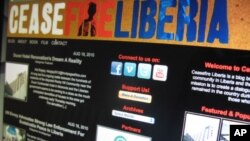Citizen media projects are giving Africans around the world new ways to connect. One such project gives those living in war ravaged Liberia as well as the country's diaspora in the United States opportunities to exchange ideas, share experiences and ease tensions.
The blog "Ceasefire Liberia" has volunteer postings from Liberia and New York, where thousands of Liberians relocated during their country's civil war, which lasted from 1989 to 2003.
Monrovia-based blogger and coordinator Nat Bayjay says it is important to have an online citizen forum like Ceasefire Liberia because so many Liberians have been displaced.
"There was a need to bridge the gap of these two groups of Liberians that found themselves on both sides of the Atlantic [Ocean]," said Nat Bayjay. "And so we thought that through the blog, we should have Liberians here share their experiences, their stories. And then we have a blogging community in the [United][S]tates specifically, Staten Island, in New York."
On the blog, there is video with interviews of Liberians in Staten Island that sends people back home a message that life in the United States is difficult.
"If you graduated and you were in college in Liberia, you probably come to America and [have to] be in the fifth grade. You are going to have to start in fifth grade and work at [fast food restaurant] Wendy's overnight and then have a day job at McDonald's and go through school at the same time," says one of the video comments.
The interviews are by American journalist and citizen media activist Ruthie Ackerman with the New York-based World Policy Institute. She launched the blog last year and says Staten Island has a long history with Liberia.
"One of the first ships that set sail to Liberia, to what became Liberia, I should say, left from the harbor at Staten Island," said Ruthie Ackerman. "And so for me, the story really does come full circle because the ship left with freed slaves and some volunteers that were being brought to West Africa."
Ackerman says that despite the lack of ready access to electricity and high Internet access fees, people in Liberia are eager to become citizen bloggers.
"The young Liberians still living in Liberia really feel a sense of urgency that their stories need to be told, that they should tell their stories because otherwise no one else is listening," she said.
Postings offer personal stories, but also investigations of communal violence, forest management and overcrowded prisons. ///
"Stories on the site have been very journalistic," said Ackerman. "Right now, there is a lot about the upcoming elections and some of the controversies and criticism around the election."
Ackerman says Liberians in Staten Island are much more reluctant to give their time to the web project.
Some of them are former child soldiers. Many arrived in Staten Island during the 1990s, which coincided with crack cocaine violence.
"There have been lots of tensions and even gang violence and shootings and issues with drugs and high incarceration rates," she said. "These were all issues that kept coming up in this community."
Ackerman received grant money this year to start a new citizen media project focused exclusively on Staten Island. But so far, she says, interest has been limited.
"It has been really difficult to get people to commit," said Ruthie Ackerman. "There is no monetary incentive at all right now; there is no business model to keep this project going other than hoping for more grants from foundations. What I keep trying to tell the young people is that the hope of this project is to unify the community so that [for] the issues of incarceration, the issues of violence in the community, [we are] trying to decrease these challenges."
Ackerman has held several workshops and received laptop computers and video cameras to help with her new project. She says the model could be duplicated for other African immigrant communities across the United States, each of which faces its own set of challenges.
Ackerman says contributors gain valuable computer and communication skills, which can help them in a difficult job market, while they also help open lines of communication in diverse American neighborhoods.
Citizen Media Bridge Liberian Divisions








